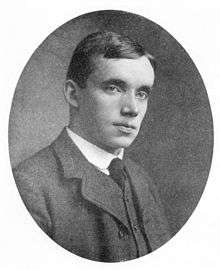James Bridie

James Bridie (3 January 1888 in Glasgow – 29 January 1951 in Edinburgh) was the pseudonym of the Scottish playwright, screenwriter and surgeon whose real name was Osborne Henry Mavor.[1][2][3][4][5] He took his pen-name from his paternal grandfather's first name and his grandmother's maiden name.[5]
Mavor studied medicine at the University of Glasgow graduating in 1913, then served as a military doctor during World War I, seeing service in France and Mesopotamia.[6] His comedic plays saw success in London, and he became a full-time writer in 1938. Despite this, he returned to the army during World War II, again serving as a doctor.[1]
He was the main founder of the Citizens Theatre in Glasgow, with his cousin, the author Guy McCrone[7] and was also instrumental in the establishment of the Edinburgh Festival.[5]
Bridie worked with the director Alfred Hitchcock in the late 1940s. They worked together on:
- The Paradine Case (1947). Bridie originally wrote the screenplay, and Ben Hecht contributed some additional dialogue. But due to casting, the characters had to be changed. So David O. Selznick had to write another script.
- Under Capricorn (1949)[1]
- Stage Fright (1950)[1]
In 1923, he married Rona Locke Bremner (1897–1985). Their son was killed in World War II.[1] His other son Ronald (1925–2007) was also both a physician and playwright.[8] Ronald became drama critic of The Scotsman after retiring from medicine, Director of the Scottish Arts Council and Deputy Chairman of the Edinburgh Festival.[5] He was Professor of Drama and Head of the Drama Department at the University of Saskatchewan and was appointed C.B.E. in 1971.[5]
James Bridie died in Edinburgh of a stroke and is buried in Glasgow Western Necropolis.[5] The Bridie Library at the Glasgow University Union is named after him, as is the annual Bridie Dinner that takes place in the Union each December.
Bibliography
- Some Talk of Alexander (1926), book, his experiences as an army doctor
- The Sunlight Sonata or To Meet the Seven Deadly Sins (1928) published under the pseudonym Mary Henderson, directed by Tyrone Guthrie
- The Switchback (1929), with James Brandane
- What It Is to Be Young (1929)
- The Girl Who Did Not Want to Go to Kuala Lumpur (1930)
- The Pardoner's Tale (1930)
- Tobias and the Angel (1930)[9]
- The Amazed Evangelist (1931)
- The Anatomist (1931) (dramatization of the historical Burke and Hare murders)
- The Dancing Bear (1931)
- Jonah and the Whale (1932)
- A Sleeping Clergyman (1933)
- Marriage Is No Joke (1934)
- Colonel Witherspoon or The Fourth Way of Greatness (1934)
- Mary Reed (with Claude Gurney) (1934)
- The Tragic Muse (1934)
- The Black Eye (1935)
- Storm in a Teacup (Adaptation) (1936) Based on Bruno Frank's Sturm im Wasserglas
- Susannah and the Elders (1937)
- The King of Nowhere (1938)
- Babes in the Wood (1938)
- The Last Trump (1938)
- The Kitchen Comedy Radio play, (1938)
- The Letter Box Rattles (1938)
- One Way of Living (1939) – Autobiography[10]
- What Say They? (1939)
- The Sign of the Prophet Jonah Radio play (1942) Adaption of Jonah and the Whale
- The Dragon and the Dove or How the Hermit Abraham Fought the Devil for His Niece (1943)
- Jonah 3 (1942) Revised version of Jonah and the Whale
- Holy Isle (1942)
- A Change for the Worse 1943
- Mr. Bolfry 1943
- Tedious and Brief (1944)
- Lancelot 1945
- Paradise Enow 1945
- The Pyrate's Den (1946) unpublished, written under the pseudonym Archibald P. Kellock
- Gog and Magog 1948
- It Depends What You Mean 1949
- The Forrigan Reel Ballad opera 1949
- Dr. Angelus 1949
- John Knox 1949
- Daphne Laureola 1949[11]
- The Golden Legend of Shults 1949
- Mr. Gillie 1950
- The Queen's Comedy 1950
- Folly to be Wise' ' 1952
- The Baikie Charivari or The Seven Prophets 1953
- Meeting at Night (With Archibald Batty) 1954
- (Adaptation) The Wild Duck. Based on Vildanden by Henrik Ibsen
- (Adaptation) Liliom Based on Ferenc Molnár's play of the same name
- (Adaptation) Hedda Gabler by Henrik Ibsen
- (Adaptation) The Misanthrope Based on Le Misanthrope by Molière
Quotations
- "Boredom is a sign of satisfied ignorance, blunted apprehension, crass sympathies, dull understanding, feeble powers of attention, and irreclaimable weakness of character."
References
- 1 2 3 4 5 Daniel Leary (1982) Dictionary of Literary Biography: Modern British Dramatists 1900-1945, Stanley Weintraub Ed., Gale, Detroit ISBN 0-8103-0937-8
- ↑ Terence Tobin (1980) James Bridie (Osborne Henry Mavor), Twayne Publishers, Boston ISBN 978-0805767865
- ↑ Winifred Bannister (1955) James Bridie and His Theatre: a study of James Bridie's personality, his stage plays, and his work for the foundation of a Scottish national theatre, Rockliff
- ↑ Helen L. Luyben (1965) James Bridie: Clown and Philosopher, University of Pennsylvania Press
- 1 2 3 4 5 6 Ronald Mavor (1988) Dr. Mavor and Mr. Bridie: Memories of James Bridie, Canongate and The National Library of Scotland ISBN 978-0862411985
- ↑ "Captain Osborne Henry Mavor". Glasgow University. Retrieved 16 May 2014.
- ↑ Burgess, Moira. "McCrone, Guy Fulton (1898–1977)". Oxford Dictionary of National Biography. Oxford University Press. Retrieved 19 October 2012.
- ↑ Helensburgh Heroes
- ↑ Kenneth Hardacre (1960) James Bridie's "Tobias and the Angel" (Chosen Eng. Texts Notes), Andrew Brodie Publications, London – Study Guide for students of the play
- ↑ Catalog of Copyright Entries. Part 1. (1940) Library of Congress
- ↑ Billboard Vol.62, No.39 (Sep 30, 1950)
External links
- James Bridie at the Internet Movie Database
- Play performances listed in Theatre Archive university of Bristol
- James Bridie at the Internet Broadway Database
